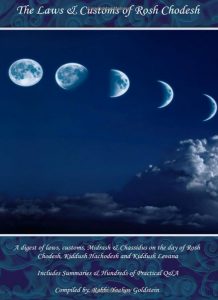This article is an excerpt from our Rosh Chodesh Sefer
Buy here or on Amazon.com
Hefsek-Making an interval to talk, answer Amen, Kedusha, and the like:[1]
Talking: It is forbidden to make an interval and talk during Hallel just as we rule regarding any other part of Davening. This applies whether the half or complete Hallel is being recited. This applies even if one does not recite a blessing over the half Hallel, nonetheless, one is prohibited from speaking in-between.[2] However, the question is raised regarding how Hallel is to be treated regarding making an interval for the sake of answering Amen to a blessing or Kaddish, saying Kedusha, and other matters of the like. Theoretically [regarding the once practiced laws of Sheilas Shalom], we find a differentiation between times that the complete Hallel is recited, versus half Hallel, however, practically, their status is viewed almost as identical regarding these laws, as will be explained.
Answering Amen/Kedusha-Complete Hallel: When the complete Hallel is recited [on Sukkos, Chanukah, Shavuos, and the first day/s of Pesach], the laws of making a Hefsek [speech interval] during Hallel follow the same stringent laws that apply to making a Hefsek during the reading of the Shema in Shacharis [see next for details].[3] This applies for both the laws of Hefsek within individual paragraphs and between paragraphs of Hallel, which are to follow the laws of within the paragraphs and between the paragraphs of Shema.[4]
Answering Amen/Kedusha-Half Hallel: When the half Hallel is recited [on Rosh Chodesh and Chol Hamoed and last days of Pesach], then it has the same laws of interval of between the paragraphs of Davening.[5] [This applies even if one is in middle of a paragraph of Hallel, nonetheless, it is treated with the same laws as between the paragraphs of Davening. This applies even if one does not recite a blessing over the half Hallel, nonetheless, one is to follow the same laws as between the paragraphs of Davening.[6] Now, there is debate regarding which part of Davening is being referred to in the words “between the paragraphs of Davening.” Some[7] learn this to mean that it has the same stringent status as between the paragraphs of Shema [and hence being that today we no longer practice the leniencies of Sheilas Shalom, practically there is no difference between the half Hallel versus the complete Hallel in regards to Hefsek]. However, others[8] learn this to mean that it has the same lenient status as Pesukei Dezimra [and hence while the complete Hallel contains strict limitations regarding the answering of Amen, in the half Hallel one may answer Amen for any blessing]. To follow is a practical list one what may be answered in the half or complete Hallel.
The practical list of what one may answer in the half or complete Hallel: Practically, one may stop to answer everything that one can answer during Shema, which includes: Amen Yihei Shimei Raba and Amen of Daamiran Bealma of Kaddish; Kadosh Kadosh, Baruch and Yimloch of Kedusha; Borchu; The three words of Modim Anachnu Lach; Amen for Birchas Hatorah, Hakeil Hakadosh and Shomeia Tefila.[9] One may make an interval even in the midst of a verse[10], although in the event that one did so he is to return to the beginning of that verse.[11]
_____________________________________________________________
[1] Admur 488:3; Michaber/Rama 422:4
[2] So is evident from Michaber ibid who in 422:2 rules a blessing is not said and then in 422:4 relates the above prohibition of Hefsek.
[3] Admur ibid; Rama ibid
The reason: As the recital of Hallel on these days is a Rabbinical obligation and hence receives a stricter status. [Admur ibid]
[4] Admur ibid; Peri Chadash 422; Kaf Hachaim 422:47
[5] Michaber 422:4 regarding Rosh Chodesh “One may ask Shalom even in the middle and for one who he must respect, and he may answer Shalom to any individual.”; Admur ibid that Chol Hamoed Pesach has the same status as Rosh Chodesh.
The reason: As on these days the recital of Hallel is only a Minhag and hence has a lesser stringency of Hefsek. [Admur ibid]
[6] So is evident from Michaber ibid who in 422:2 rules a blessing is not said and then in 422:4 relates the above prohibition of Hefsek.
[7] Hefsek Betefilah 4:10 [p. 80] and p. 196; Dinei Uminhagei Rosh Chodesh Chabad 8:12 based on Admur 66:5 [and Chayeh Adam 20:4] that one may not make an interval of Amen between the paragraphs of Birchas Shema; Hiskashrus 441
[8] Nitei Gavriel Pesach 7:12 [p. 69]; Yabia Omer 2:32; The Peri Megadim 51 and glosses of Rav Akiva Eiger rule it is permitted to make an interval of Amen between the paragraphs of Birchas Shema. [See M”B 66:23]
[9] See Admur 66:4-5; Siddur Admur
[10] Admur 66:4; Kaf Hachaim 422:46
[11] Ketzos Hashulchan 18:2



Leave A Comment?
You must be logged in to post a comment.